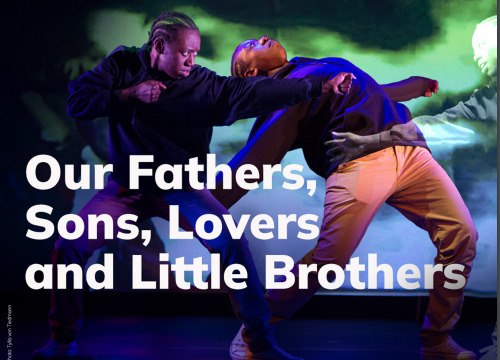Content Warning: Discussion of anti-Black racism, police brutality, and murder
While Our Fathers, Sons, Lovers and Little Brothers arrived in Montreal at the end of Black History Month, this solo theatrical work serves as a striking affirmation that Black lives matter year round. Created and performed by Makambe K. Simamba, this co-production between Black Theatre Workshop and Toronto’s Tarragon Theatre ran from Feb. 22 to 26 at the Segal Centre.
The play invites audience members into the final moments of Slimm’s life, a 17-year-old from Miami who is murdered in an incident of anti-Black violence. Stuck in a mysterious liminal space, he must follow the steps his ancestors set out for him to prepare for his journey into the afterlife.
Portraying the story of the real-life teen Trayvon “Slimm” Martin almost 11 years to the day after his tragic death, the play offers audiences a fictionalized look into Slimm’s life—a defiant opposition to the media’s tendency to focus on his infamous murder. On Feb. 26, 2012, Martin was walking back from a convenience store to his father’s fiancée’s house in a gated community when he was shot and killed by George Zimmerman. The captain of the local neighbourhood watch, Zimmerman claimed that Martin appeared suspicious and that he had been forced to shoot the teenager in self-defence after a dangerous physical altercation. Though charged with second-degree murder, Zimmerman was acquitted by the jury. Zimmerman’s acquittal sparked outrage across America as people fought to gain justice for Martin. This wave of protests against police brutality and anti-Black racism led to the eventual formation of the Black Lives Matter movement in 2013.
To bring Martin to life, Simamba spent much of the creation and rehearsal process developing a movement style and vocabulary that felt representative of Black American youth at the time.
“I wanted to explore 17-year-old hip hop culture, […] what that physicality and culture might have been,” Simamba said in an interview with The McGill Tribune. “In 2012, a lot of Black boys and teenagers were trending, and seeing the way in which young Black bodies were setting trends, dance moves, language [….] I leaned into it pretty naturally.”
In developing this physicality and vocal quality, Simamba expertly captured Martin’s energy and provided the audience with a clear-cut way of distinguishing between the various characters she plays throughout the story; Martin’s low, relaxed voice and slouched body contrasted with his mother’s higher, reedy voice and upright posture. Simamba shifted between characters swiftly and effortlessly, demonstrating an impressive command of her physical and vocal abilities.
Now a nearly 90-minute play, Our Fathers, Sons, Lovers and Little Brothers was originally developed as a 10-minute solo piece while Simamba was participating in the Calgary theatre company One Yellow Rabbit’s Summer Lab Intensive in 2016. Simamba then continued to develop and refine the work for several years before its world premiere in Toronto at b current Performing Arts in 2019. The current production, directed by three-time Governor General’s Award nominee Donna Michelle St. Bernard, will continue to tour across Canada after its run at Black Theatre Workshop.
Although it is distressing that the play continues to reflect the ongoing police brutality experienced by Black people in North America in 2023, Simamba recognized the importance of showcasing her play in a country where many continue to believe that anti-Black racism is a problem reserved for our neighbours south of the border.
“That division does not exist in the way people think it does,” Simamba said. “There are Canadian names on the list [of victims of police brutality]. It’s not just one group or one country that’s doing this.”
The play’s ending made the passage of time since 2012 feel even more striking. Simamba ended the performance by reciting a list of names—police brutality victims from the 1800s to the present. The devastating list went on for 10 minutes and included five names from 2023.








